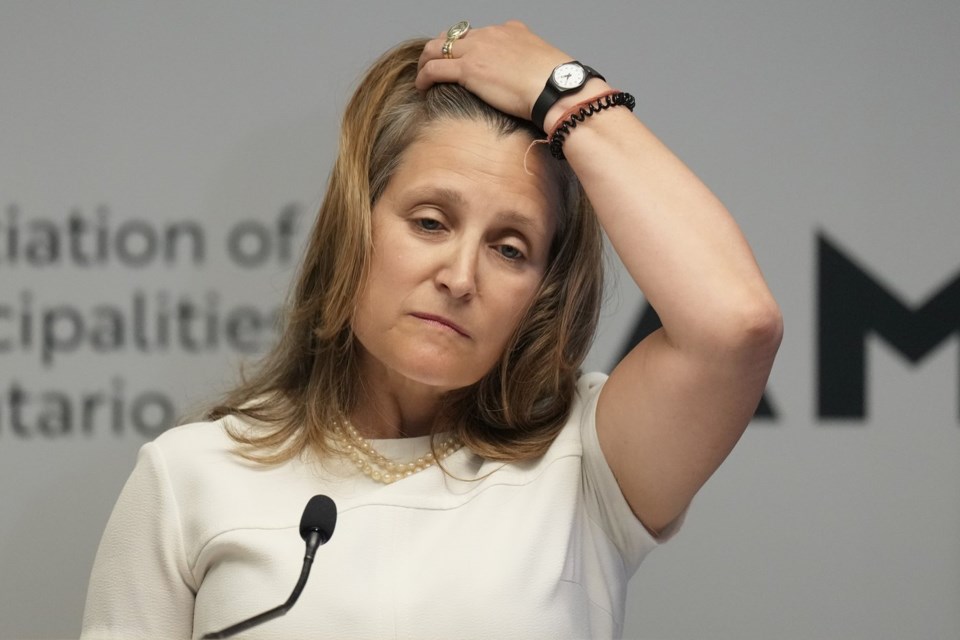OTTAWA — A historic defeat for the Liberals in a downtown Toronto byelection has put a glaring question mark on Prime Minister Justin Trudeau's political future.
Insiders warn the Conservative victory could be a sign portending a Tory blue wave when the rest of sa国际传媒 goes to the polls.
Here's a look at the options Trudeau and the Liberals face as they enter a summer of soul-searching.
Liberals look for a new saviour
It's hard to imagine Trudeau staying until the next election, said Phillipe Fournier of 338sa国际传媒.com, which publishes a statistical model of electoral projections based on polling, demographics and elections history.
"If I may make a hockey analogy, it's 5-0 after the second period," Fournier said Tuesday.
"You pull your goalie because it's just getting humiliating."
While there's a real risk that picking a new leader may not be enough to reverse the Liberals' fortunes, Fournier asked: "Does it matter?"
"This is not a normal defeat," Fournier said of the byelection results. And when it comes to a general election: "This is heading to be a historic defeat."
The Liberals may need to search for another "saviour," he said — as Trudeau was seen when he pulled the Liberals back from historic lows after the Conservatives' 2011 majority win.
But the clock is running out to stage a potential leadership race, with a federal election slated to happen no later than October 2025.
And history dictates that switching leaders doesn't guarantee new results. Take the situation in 1993, when Kim Campbell and the erstwhile Progressive Conservatives were nearly wiped off the map after former prime minister Brian Mulroney resigned.
That year, the Liberals captured Toronto-St. Pauls. They held it until early Tuesday.
For the Conservatives, there's hope that Trudeau sticks around, given his low popularity and the fact a Liberal leadership race would bring a push for membership sales and fundraising.
The prime minister stays and fights
As it stands, the prime minister is giving no hints he plans to follow in his late father's footsteps and take a walk in the snow — or the sun, or the rain — anytime soon.
Deputy Prime Minister Chrystia Freeland said Tuesday she thinks he should stay on.
And Leslie Church, the longtime political staffer who ran and lost as the Liberals' candidate in the byelection, said now isn't the time to walk away, but instead to re-earn the trust of voters.
After nearly a year of public opinion polls showing a growing appetite for change across the country, that will be easier said than done.
The Liberals need to find a way to embrace the current atmosphere of change, said Scott Reid, who worked as the director of communications for former prime minister Paul Martin.
"The government has to reconcile itself to the conclusion that if it doesn't channel change, it will become the victim of change," he said.
"But pretending that they're on the right course, and pretending that all is well, and that Canadians just haven't tuned in yet to politics (and) aren't really thinking about their choices — that mirage has been shattered."
One point of proof, political insiders note: the byelection had unusually high turnout, especially for a summer contest.
Trudeau calls a snap election
If Trudeau felt like it, he could look across the pond to his counterparts in France and the United Kingdom for inspiration.
Both of them recently took bad results and turned them into a reason to plunge into campaign mode.
British Prime Minister Rishi Sunak triggered a snap election in late May after a tumultuous run for his Conservatives, who have cycled through five prime ministers over the past 14 years.
Earlier this month, French President Emmanuel Macron shocked the nation by calling a snap election following an abysmal showing for the party in a vote by European Parliament that saw a rise in far-right parties.
Trudeau might find that Macron's experience so far is a reason not to pull the plug, Fournier suggested.
"I haven't seen anybody who said Macron's idea was good."
Trudeau said Tuesday he knows his team has "much more work to do" — and that they are committed to following through on that.
The New Democrats prepare to trigger an election
If they wanted to, the next time the House of Commons is in session, New Democrats could pull their support from the minority Liberals and vote against the government on a confidence matter, triggering an election.
But while the Liberals are reeling from their loss, the NDP also has reason to worry.
NDP Leader Jagmeet Singh saw his share of the vote drop to around 11 per cent in the byelection, down from the nearly 17 per cent he captured in 2021.
A longtime party operative and national director-turned-principal secretary to Singh, Anne McGrath, dismissed the need for soul-searching, saying the race was always set up to be a battle between the Liberals and Conservatives.
"We have never come in second," she said in an interview.
She also rejected the idea that it was time to consider breaking off the supply-and-confidence deal, in which the NDP votes with the Liberals on key legislation in exchange for progress on shared priorities like dental care and pharmacare.
"We're going to be continuing to push to get those things done," she said.
"And I will say that in any byelection where the results are different than anticipated, (it) makes every party try to figure out what that was about."
This report by The Canadian Press was first published June 25, 2024.
— With files from Mickey Djuric, Laura Osman and The Associated Press.
Stephanie Taylor, The Canadian Press



